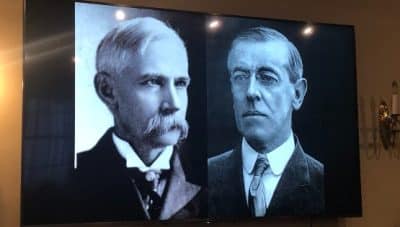
Some major road projects like the 495 Express Lanes, which debuted last month in Northern Virginia, are years, and in some cases, decades, in the making. The construction of the I-95 Express Lanes project in Northern Virginia is now underway. As a sorely needed shot in the arm to the economy, such projects are creating thousands of construction jobs across the area.
In recent years we have seen the negative impact of the backlog of transportation needs and the positive benefits of transportation investments. We sorely need long-term investment in highways and public transportation projects at the federal, state and local levels. This year, we finally got that at the federal level, when President Barack Obama signed into law a bi-partisan, two-year transportation bill that contains many policy and program reforms, long advocated and supported by AAA. This new law promises to help rebuild public trust in the nation’s federal transportation program by eliminating earmarks, promoting road and bridge safety, and by better focusing federal dollars on national goals and objectives. It is one of the biggest highlights of the year on the transportation front.
“At long last, we are seeing real progress at the national level, but it might be a different story locally and regionally in years to come. Despite the glut of major transportation projects currently underway in the region, we are nearing the end of the road. The transportation funding spigot is unfortunately running dry in Virginia,” said Martha Mitchell Meade, AAA Mid-Atlantic’s Manager of Public and Government Affairs. “To change the status quo, you now have to have a primary and reliable funding source or funding mechanism, sound transportation policies, good transportation projects in the hopper, the commitment to undertake such projects and to support public transportation and rail programs, and the political willingness and wherewithal to see the projects through.”
“In reality, it all boils down to who gets things done,” added Meade. “And that is the overarching criterion or measuring rod that we using this year to decide the absolute best, and the out-and-out worst in transportation in 2012.”
Here are the highs and lows and the milestones and millstones on the transportation front in the year that was 2012.
THE BEST: MILESTONES
Virginia Enacts Tough DUI Ignition Interlock Law. Virginia’s new ignition interlock device law is being hailed as one of the toughest in the region. If you are caught red-handed driving over the legal limit and convicted of drunk driving, the law will force you to install a DUI ignition interlock device in your vehicle as a condition of a restricted driver’s license. The device will trigger the horn and flashing lights, if the operator has a BAC that exceeds 0.02 percent, or if the driver fails to take the test. Supporters say the new law will quadruple the number of persons required to use the device. Last year, 28,162 drivers were convicted of DUI in Virginia, according to the Virginia Department of Motor Vehicles (DMV). The new law went into effect this past July.
Express Yourself! The Début of the 495 Express Lanes. The Interstate 495 Express Lanes officially debuted last month. It’s a big deal because for the first time it allows the Capitol Beltway to offer HOV-3 connections with I-95/395, I-66, and the Dulles Toll Road. Equally important, it gives gridlock-weary drivers on the Capital Beltway in northern Virginia an escape route from the world-class congestion that bedevils motorists and besets the entire region. It comes with a price, you will pay for the privilege unless you have three passengers riding shotgun. Construction started on the $2 billion all-electronic toll road in July of 2008. The 14-mile-long route stretches in both directions on I-495 from the Springfield Interchange to just north of the Dulles Toll Road. After a rough adjustment period, drivers are still growing accustom to the Express Lanes and to new road configurations in the area. After all, it’s the biggest change in traffic patterns in the region since Interstate 66 opened decades ago. Drivers should stay alert and be careful.
Express Toll Lanes on Interstate 95 in Northern Virginia. Construction started this year on the $1 billion I-95 Express Lanes project between Edsall Road in Fairfax County and Garrisonville Road in Stafford County. It is due for completion in early 2015.
THE WORST: MILLSTONES
Lack of Long Term Sustainable Transportation Funding: The transportation funding crisis in Virginia once again tops the worst list in Virginia. While Governor McDonnell authorized a new bond package two years ago of almost $4 billion, Virginia still has significant transportation funding needs. The last substantial and sustainable funds for transportation in Virginia were in the form of a gas tax increase in 1986. In the past decade, more than $3 billion of road construction funds have been diverted to repairs and maintenance. At the current pace, all construction funding will have to be utilized for maintenance by 2017. That would also eliminate the commonwealth’s ability to receive federal funds for construction. As a result, federal gas taxes paid by Virginia drivers would be diverted to other states. In addition, Virginia’s gas tax is lower than any from the surrounding states and one of the lowest in the nation. Gas tax effectiveness has eroded because the cost to build and maintain roads has increased since 1986. The current gas tax of 17.5 cents now equates to just 8 cents.
Problem with Texting Ban in Virginia Identified. In May of this year, a man driving in Alexandria, Virginia struck and killed a young college student. The driver was believed to be texting at the time of the crash. In Virginia, a driver cannot be pulled over for texting alone as the law is not a primary offense and if ticketed for the offense the punishment is nothing more than a slap on the wrist. Adding to the existing tragedy, the judge in the case was unable to maintain the charge of reckless driving because Virginia law defines texting while driving as a minor traffic offense, punishable by a maximum fine of $20. AAA is now working with other traffic safety advocates and lawmakers to not only strengthen the law in 2013 but also to make it a primary enforcement statute. This would allow police officers to pull over driver’s suspected of texting while driving.
Preliminary Data: Highway Death Toll Increases in USA. The early estimates are in, and they are tragic. They indicate 25,580 people died in traffic fatalities across the USA during the first nine months of 2012 (January-September). Those chilling figures represent a 7.1 percent increase from the same time period in 2011. If accurate, the early estimates would represent the largest increase in the highway death toll during the first nine months of any year since 1975. That’s the year the National Highway Traffic Safety Administration (NHTSA) began collecting fatality data. The federal agency hasn’t fingered a reason for the increase. However, vehicle miles traveled (VMT) also increased during this same time period by 0.6 percent or about 14.2 billion miles. Think of it this way: VMT, which tracks the number of miles drivers travel, is a measure of exposure to the risk of being in a highway traffic crash. This is preliminary data and the numbers could still change and trend downward. Despite this bad news, traffic injuries are still 27% lower than the most recent highs seen in 2006.
The High Cost of Motor Fuels. At long last, gasoline prices are dropping just as we say goodbye to 2012. It is too little, too late for tightfisted consumers and motorists across the country. Here’s why. The average annual price cost for motor fuel for 2012 will be the most expensive on record. The gas price gurus at the Oil Price Information Service (OPIS) have already crunched the numbers and they are forecasting pinchpenny motorists will end up spending $483 billion on gasoline this year. The collective annual tab was $481 billion in 2011. Consumers spent $389 billion on gas purchases in 2010, and forked out $324 billion in 2009. Back in 2008, consumers shelled out a then all-time record amount in annual fuel costs, $448 billion.
Hopeless In Hopewell. “Abandon all hope ye who enter here!” Today’s Dante’s immortal line could apply to the plight of motorists ticketed along a nearly two-mile segment of Interstate 295 near Hopewell, Virginia. That notorious stretch of road has been dubbed the “Million Dollar Mile” because of the penchant of Sheriff’s deputies in Hopewell to hand out thousands of tickets to unsuspecting motorists and out-of-state drivers. As a result, revenue from traffic fines for the little bitty town along the interstate soared by more than a 1000 percent (1150%) to nearly $2 million last year from an infinitesimally lackluster amount of $160,000 back 2008.
The Tollman Cometh: More Toll Roads and Toll Hikes In The Future. A brouhaha is brewing over VDOT’s tolling proposal for the Interstate 95 and its request to add truck toll lanes to I-81 in Virginia. VDOT is floating the notion of charging motorists $4 and big rig truckers $12 to traverse the179 mile length of I-95 that meanders through the state from the North Carolina borderline to the Maryland boundary. In reaction, hundreds of petitions and letters of opposition are circulating both in Virginia and eastern North Carolina. They are up in arms about the notion of imposing hefty tolls on an existing interstate, something that 66% of Virginians find anathema, according to AAA Mid-Atlantic’s 2011 transportation poll.










